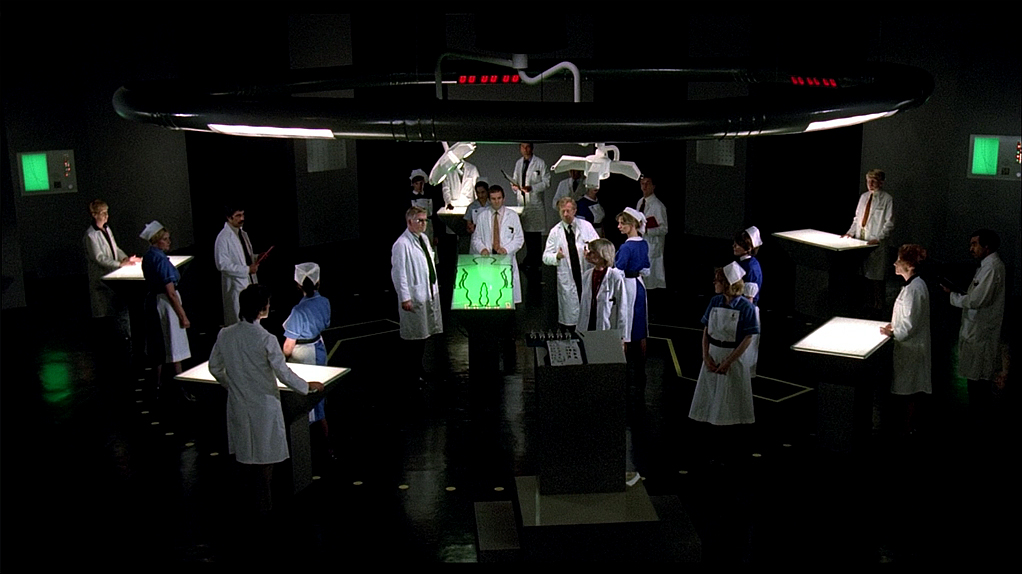1982, certificate 15
“Released just as the Falklands War triggered an unexpected wave of British jingoism, this venomous state-of-the-nation movie ran counter to the mood of the times. Private health care, the delusions of science, the complicity of the media and the fantasy of Empire are all comprehensively dumped upon. Coaxing Brechtian, anti-realist performances out of his cast – and using that cast to collapse the stifling distinction between high and low culture (Robin Askwith shares the screen with Joan Plowright) – Anderson produced a shockingly truthful caricature of Britain on the cusp of the Thatcher revolution… Here was a film which combined the off-the-wall, anti-establishment humour of Monty Python with a deep moral seriousness, a fluid cinematic language and a real charge of poetry and ideas: a rare combination, one which you certainly won’t find in the work of any other British director, living or dead.”
(Jonathan Coe, extracted from The Guardian)
The film is 1 hour 56 minutes long.
Part of Thinking Creatively. After 1968, a Trilogy of Resistance by Lindsay Anderson, Malcolm McDowell and David Sherwin, in memory of David Sherwin (1942-2018). If… screening on Sunday 3rd at 19:45, and O Lucky Man! on Tuesday 5th at 15:00. Programme notes available at the three screenings.
“…by 1985 Sherwin was trying to claim dole, only to be told that he was ineligible because he “thought creatively” for more than 24 hours a week”.
(from The Guardian)
“The screenwriter David Sherwin was a special friend. We went through many girlfriends, marriages, triumphs and disasters together. I even wore his father’s demob coat from after the second world war in the opening shot of If… It was perfect. It was my entrance into film. It has become a rather iconic image. David and I had a unique relationship: my first film as an actor was his first screenplay. I met him in 1967 at the audition of If… The actress I was playing with, Christine Noonan, punched me rather hard in the face. I was knocked to the floor, my script flew everywhere. There was stunned silence and my eyes welled with tears from the shock of being hit so hard. When I regained my composure the energy between us became electric. It made for good drama. Lindsay Anderson, the director, called for the audition to end. David jumped to his feet and shouted: “Lindsay, you have found your Mick!” Lindsay was irritated by his outburst and scolded: “That is not how you cast a film David, now piss off!” I was cast in his first film and mine. It started my career.”
The 50th anniversary of If…. falls this year. David helped change cinema as we know it. He was an extraordinarily good writer who was never given the credit he deserved. I remember writing scenes with him for O Lucky Man! and when we were finished we would read what was on the page and laugh about whether Lindsay would consider the writing “epic” or “mini”. By Lindsay’s definition “mini” was unfocused and uninteresting, while “epic” had great style, was illuminating. Our production company was called SAM Productions, for Sherwin, Anderson and McDowell. With the Mick Travis trilogy, David wrote three amazing films. Crusaders (which became If…) was David’s original idea, which Lindsay took and made mostly about his own life. Coffee Man (which became O Lucky Man!) was mainly my story.
Britannia Hospital is more David’s. He had seen a newspaper article about England’s first heart transplant team. In the photos the doctors were wearing specially made neckties and blazers. Photographed before they had done any successful surgery, they seemed to be waiting for some unsuspecting victim. This spurred his fascination with the National Health system.
I was shooting A Clockwork Orange and Lindsay and David were working on O Lucky Man! when I received a card from Lindsay that he had written from his mother’s house on the beach in Hyde, Kent. It read: “Author drunk on floor, I don’t think we will ever make O Lucky Man!” A week passed – another card arrived: “Very fine work on the script! Things looking up … Looks like we will do the film after all!” Of course, Lindsay’s magic dust was sprinkled over everything but it was all very much a collaboration between three partners. Lindsay didn’t write; he dictated and shaped. David got it on the page”
Malcolm McDowell, extracted from The Guardian, 2.2.18.
